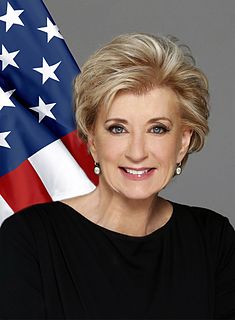Top 207 Lending Quotes & Sayings - Page 4
Explore popular Lending quotes.
Last updated on November 20, 2024.
It was Carrot who'd suggested to the Patrician that hardened criminals should be given the chance to 'serve the community' by redecorating the homes of the elderly, lending a new terror to old age and, given Ankh-Morpork's crime rate, leading to at least one old lady having her front room wallpapered so many times in six months that now she could only get in sideways.
We want to create more jobs. We want to qualify more lenders and expand lending markets. But also, I want a very different SBA - it's not your father's SBA. I want to modernize it and reposition it so when people think about jobs, they think about how the Small Business Administration would really be helpful.
Tis moonlight, summer moonlight,
All soft and still and fair;
The solemn hour of midnight
Breathes sweet thoughts everywhere,
But most where trees are sending
Their breezy boughs on high,
Or stooping low are lending
A shelter from the sky.
And there in those wild bowers
A lovely form is laid;
Green grass and dew-steeped flowers
Wave gently round her head.
Let us no longer be blinded by the dim theology that only in the far seeing vision discovers a millennium, when violence shall no more be heard in the land wasting nor destruction in her borders; but let us behold it now, nigh at the door lending faith and confidence to our hopes, assuring us that even we ourselves shall be instrumental in proclaiming liberty to the captive.
Let's look at lending, where they're using big data for the credit side. And it's just credit data enhanced, by the way, which we do, too. It's nothing mystical. But they're very good at reducing the pain points. They can underwrite it quicker using - I'm just going to call it big data, for lack of a better term: "Why does it take two weeks? Why can't you do it in 15 minutes?"
African Americans, in particular, saw their cumulative wealth crash. They used to have 10 cents on the dollar of the average white family. That 10 cents on the dollar that the African American family used to have crashed down to 5 cents on the dollar, given the focus of predatory lending on the African American community and the degree to which they were really devastated by the foreclosure crisis. So yeah, I think there is a lot of disappointment out there.
There's only one thing different about Barack Obama when it comes to being a Democratic presidential candidate. He's half African-American. Whether that will make any difference, I don't know. I haven't heard him have a strong crackdown on economic exploitation in the ghettos. Payday loans, predatory lending, asbestos, lead. What's keeping him from doing that? Is it because he wants to talk white? He doesn't want to appear like Jesse Jackson? We'll see all that play out in the next few months and if he gets elected afterwards.
The Fed is pushing a variety of workarounds that would inject trillions in new money into the economy while bypassing the banking system altogether. Time will tell whether or not this will succeed. Meanwhile, a serious danger lurks around the corner. Once the recession is over, the lending will start again. With fractional-reserve banking and limitless supplies of cash on hand, we will likely see the overall price trends reversed, from deflation to inflation to possible hyperinflation.
I am asking my Attorney General to create a special unit of federal prosecutors and leading state attorneys general to expand our investigations into the abusive lending and packaging of risky mortgages that led to the housing crisis. This new unit will hold accountable those who broke the law, speed assistance to homeowners, and help turn the page on an era of recklessness that hurt so many Americans.
This Power Elite directly employs several millions of the country´s working force in its factories, offices and stores, controls many millions more by lending them the money to buy its products, and, through its ownership of the media of mass communication, influences the thoughts, the feelings and the actions of virtually everybody. To parody the words of W. Churchill, never have so many been manipulated so much by few.
The impact of QE on generating more lending by Wall Street to Main Street and in generating more employment and increasing overall investment in the economy is quite modest. QE probably limited the initial collapse of the economy in 2008, and likely had a very small positive impact on economic growth, but its broader impact on jobs and growth in the economy seems not very big.
Anyone believing the TPP is good for Americans take note: The foreign subsidiaries of U.S.-based corporations could just as easily challenge any U.S. government regulation they claim unfairly diminishes their profits - say, a regulation protecting American consumers from unsafe products or unhealthy foods, investors from fraudulent securities or predatory lending, workers from unsafe working conditions, taxpayers from another bailout of Wall Street, or the environment from toxic emissions.
The Rothschilds, and that class of money-lenders of whom they are the representatives and agents - men who never think of lending a shilling to their next-door neighbors, for purposes of honest industry, unless upon the most ample security, and at the highest rate of interest - stand ready, at all times, to lend money in unlimited amounts to those robbers and murderers, who call themselves governments, to be expended in shooting down those who do not submit quietly to being robbed and enslaved.
In the first place, it is obvious that not only is wealth concentrated in our times but an immense power and despotic economic dictatorship is consolidated in the hands of a few, who often are not owners but only the trustees and managing directors of invested funds which they administer according to their own arbitrary will and pleasure. This dictatorship is being most forcibly exercised by those who, since they hold the money and completely control it, control credit also and rule the lending of money.
When excesses such as lax lending standards become widespread and persist for some time, people are lulled into a false sense of security, creating an even more dangerous situation. In some cases, excesses migrate beyond regional or national borders, raising the ante for investors and governments. These excesses will eventually end, triggering a crisis at least in proportion to the degree of the excesses. Correlations between asset classes may be surprisingly high when leverage rapidly unwinds.
When I say the economy is shrinking, it's the economy of the 99%, the people who have to work for a living and depend on earning money for what they can spend. The 1% makes its money basically by lending out their money to the 99%, on charging interest and speculating. So the stock market's doubled, the bond market's gone way up, and the 1% are earning more money than ever before, but the 99% are not. They're having to pay the 1%.
Business is about problem-solving, but it does not always have to be about maximizing profit. When I went into business, my interest was to figure out how to solve problems I see in front of me. That's why I looked at the poverty issue. I got involved in lots of things to address it, and one of them was money lending with loans and credits and savings accounts, and in the process I created Grameen Bank. So you can also have social objectives. Ask yourself these questions: Who are you? What kind of world do you want?
While it may not heighten our sympathy, wit widens our horizons by its flashes, revealing remote hidden affiliations and drawing laughter from far afield; humor, in contrast, strikes up fellow feeling, and though it does not leap so much across time and space, enriches our insight into the universal in familiar things, lending it a local habitation and a name.
Initially, QE contributed to a pretty significant increase in inequality. It raised asset prices, which are owned primarily by the wealthy, while having relatively small if any positive impacts on bank lending, employment, wages or economic growth, so ordinary people haven't had much help. By the third round of QE in 2012-2014, the effects had likely muted quite a bit. There were probably not big impacts on asset prices from QE and the positive effects on employment growth might have strengthened somewhat.
A lot of these things have hurt the average American. When they look at the banks and they say, "Well, the bank's talking its own game," I am telling you, what we've done in mortgage lending, our inability to have proper regulations around mortgages, has hurt average Americans. First-time buyers, immigrant buyers, prior defaults, self-employed, because they can't get a mortgage. Will it make a big difference to JPMorgan Chase? No, but you're hurting my fellow citizens. Let's go at it, and let's fix it.
Financial institutions have been merging into a smaller number of very large banks. Almost all banks are interrelated. So the financial ecology is swelling into gigantic, incestuous, bureaucratic banks-when one fails, they all fall. We have moved from a diversified ecology of small banks, with varied lending policies, to a more homogeneous framework of firms that all resemble one another. True, we now have fewer failures, but when they occur... I shiver at the thought.
What do the 5%, or the 1% actually use their money for? They lend it back to the economy at large, they load it down with debt. They make their money by lending to the bottom 95%, or the bottom 99%. When you give them more after-tax income, it enables them to buy even more control of government, even more control of election campaigns. They're not going to spend this money back into the goods-and-services economy.
Ninety-seven percent of the CEOs of the Fortune 500 are white men, and what they do radiates all the way down into poor areas and cities around our country. Like predatory lending and misallocation of municipal services. These guys get municipal service, poor areas don't. So they run the economy into the ground, and who suffers the most? The poor pay more and they die earlier.
Republican leaders have made clear they have no plans to use the power of government to stimulate the economy, invest in job creation and spur job growth. The Fed's plan is to give banks more money to finance the private sector job creation. But banks have ample cash now; they aren't lending, and the private sector is not creating the jobs. That is why we have 15 million people unemployed.
One nation banking recognises that banks must not be isolated from the rest of the economy. Because banks and small businesses must succeed or fail together, banks must lend to small businesses so we can get the growth and jobs we need for the future. As things stand, that is not happening enough. Lending was down £10.8billion last year.
But when a man draws a lifeless thing into his passionate longing for dialogue, lending it independence and as it were a soul, then there may dawn in him the presentiment of a world-wide dialogue with the world-happening that steps up to him even in his environment, which consists partially of things. Or do you seriously think that the giving and taking of signs halts on the threshold of that business where an honest and open spirit is found?






















